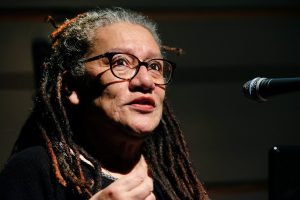 “We can benefit from the enlarged and varied imagination that literature, films, and other cultural products afford us to start to occupy different positionings than we usually occupy.”
“We can benefit from the enlarged and varied imagination that literature, films, and other cultural products afford us to start to occupy different positionings than we usually occupy.”
Gloria Wekker is an Afro-Surinamese Dutch scholar, whose extensive body of work has brought questions of colonialism, race, gender, sexuality and diaspora to the forefront of critical scholarship on the Netherlands and the Dutch Empire. In the Dutch context, Gloria Wekker has been fundamental to understanding and confronting racial and colonial legacies, and the varying ways in which these are reproduced in the Netherlands today. Gloria Wekker’s writing and passion have transcended the bounds of academia and inspired scholars and activists who continue to grapple with the legacies of empire today. In 1984, she became a founding member of “Sister Outsider”, an Amsterdam-based literary circle for lesbian black women named after Audre Lorde’s famous text by the same name. She has inspired an entire new generation of scholars and activists in both the Netherlands and beyond to take up questions of colonialism and race, and to do so intersectionally. Recently she was named one of the most influential Dutch academics.
Wekker’s contribution to critical race theory and studies of the Netherlands and its empire has been to develop the concept of white innocence. In her monumental book, White Innocence: Paradoxes of Colonialism and Race, Wekker focuses on the contradiction between the Dutch tendency to represent the nation as ethical and racism-free and the aggressive and deep racism that characterises Dutch society. Exploring a cultural archive stretching back through 400 years of Dutch colonial rule, Wekker challenges the dominant narrative of the Netherlands as a tolerant and ethical nation. Focusing on the ways in which race is represented in Dutch culture—for example through the famous Dutch Christmas character Zwarte Piet, who wears Blackface—she shows that the denial of racism and the expression of innocence protects white privilege. It is this expression of innocence that gives the title to this book; by constantly professing innocence, the Netherlands consistently refuses to face its legacy of racism that continues today.
“With the title White Innocence, I am invoking an important and apparently satisfying way of being in the world. It encapsulates a dominant way in which the Dutch think of themselves, as being a small, but just, ethical nation; colour-blind, thus free of racism; as being inherently on the moral and ethical high ground, thus a guiding light to other folks and nations. Notwithstanding the many, daily protestations in a Dutch context that “we” are innocent, racially speaking; that racism is a feature found in the US and South Africa, not the Netherlands; that, by definition, racism is located in working-class circles, not among “our kind of middle-class people”; much remains hidden under the univocally and the pure strength of will defending innocence. I am led to suspect bad faith; innocence is not as innocent as it appears to be.”
Wekker’s concept of white innocence has been extremely influential, and has been used by scholars to analyse contexts inside and outside of Europe. Her skilful use of intersectionality as a research framework has inspired scholars and demonstrated the political importance of doing intersectional work. Wekker’s work has shown that power relations continue to condition Western nations today, and reproduce colonial dynamics and racialized politics. With her legacy of work she has made an incredible imprint on scholarship inside and outside of the Netherlands.
Essential reading:
Wekker, G. (2016). White innocence: Paradoxes of colonialism and race. Duke University Press.
Wekker, G. (2006). The politics of passion: Women’s sexual culture in the Afro-Surinamese diaspora. Columbia University Press.
Wekker, G. (2004). Still crazy after all those years… Feminism for the New Millennium. European Journal of Women’s Studies, 11(4), 487-500.
Further reading:
Wekker, G. (2009). Another dream of a common language: Imagining Black Europe. Black Europe and the African Diaspora, 98, 277.
Wekker, G. (1993). Mati-ism and Black lesbianism: Two ideal typical expressions of female homosexuality in Black communities of the Diaspora. Journal of homosexuality, 24(3-4), 145-158.
Wekker, G., & Wekker, H. (1991). Coming in from the cold: Linguistic and socio-cultural aspects of the translation of Black English Vernacular literary texts into Surinamese Dutch. Babel, 37(4), 221-239.
Questions:
How does the concept of white innocence describe racialized politics in contexts around the world?
How does intersectionality reveal the connections between race, gender, sexuality, nation and class?
Why is this important?
Submitted by Sara Salem